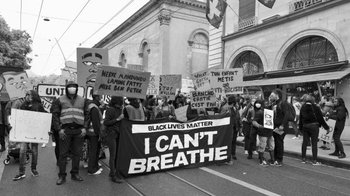Humanitarianism has evolved and transformed over its lifetime, and so, too, has the location of race in maintaining what W.E.B. Dubois famously called the “global colour line.”
Much of contemporary humanitarianism emerged from imperialism and colonialism, which wore its racism on its sleeves. The liberal humanitarians and missionaries of the day had two dominant views of non-Caucasians.
One was that they would probably never develop the cognitive and emotional maturity for self-rule and self-care, and that humanitarians had to protect the indigenous peoples from themselves.
The other followed from liberalism and the enlightenment as it recognised that all humans are equal – but some are more equal than others because some were ‘more civilised’. The West would ‘civilise’ the rest through religious conversion, education, facility with technology, improved hygiene, economic rationality, and other traits used to define its superiority. Racism and paternalism went hand-in-hand in these civilising missions.
Persisting racism in the aid sector
The impact of the worldwide Black Lives Matters protests on the humanitarian sector underscores that racism did not magically disappear with colonialism and civilising missions. Long ignoring the racism in their midst, Western aid agencies like Save the Children are now taking a hard look at themselves and pledging to dismantle it.

Photo credit: Flickr/Del-Uks.
Although Western aid agencies are new to the possibility of racism in the aid sector, this is hardly news to Southern aid agencies and workers of colour, who have pointed out the often subtle but significant impact of racism. This institutionalised racism is not just hurtful to those of colour in the aid sector, but also positively harmful to those in need.
In my research on the persistence of inequality in humanitarian governance and the resistance to localisation, I have spoken with many staff from the so-called global South that recount considerable racism in their interactions with Western aid agencies. The West see people of colour as inferior; accordingly, they are infantilised and paternalised. Partnership means that the white people own the house and the people of colour are the hired help. When workers of colour from the global South ask for more responsibility and power, they are told that they are not quite ready and need more training and education. Sometimes they are admitted into the inner sanctums of decision-making and power, but they describe being tokens that are signaled to remember their place. The humanitarian colour line remains.
Partnership means that the white people own the house and the people of colour are the hired help.
Inequality through understanding of competence
It can be difficult to untangle race from other factors that account for this on-going inequality between Western and Southern agencies. My interviews for my research with staff from Western and Southern aid agencies illuminate the critical discourse of competence. Since the 1990s the humanitarian sector has increasingly emphasised the importance of knowledge, expertise, professionalism, and competence. What is needed is evidence-based humanitarianism, and aid workers must learn how to collect, analyse, and use evidence to improve outcomes. Such skills require knowledge. Learned and local knowledge is still important, but it does not have the same status as knowledge acquired from accredited institutions that comes with a certificate or diploma. Expert knowledge is objective while local knowledge is subjective. Expert knowledge is generalisable and travels from one site to another, while local knowledge is, well, limited to the local. Expert knowledge is based on data while local knowledge is reduced to stories and anecdotes.
Although the training and education required to acquire this expert knowledge is available to all, those from the West have various advantages. To begin, the dominant educational sites, and the places that produce most of the research, are located in the West. Masters and certificate programs are not cheap, and those from the West generally have more resources to attend than those from the South. Proximity also makes a difference.

Photo credit: Flickr/Student Bills Company
It is just a lot easier for someone from, say, Chicago to attend the Feinstein Center at Tufts University than for someone from Kinshasa. Knowledge production reflects and reproduces the existing inequalities.
Ingrained categorical distinctions
Even when they acquire these symbols of advanced training, as Adia Benton has documented, they still encounter suspicions of their qualifications. My observation is that race is intertwined with judgments about competence. There is a line of sociological research that suggests how. For argument’s sake, let’s assume that, due to initial advantages such as training and resources, Western aid agencies are better than locals at saving lives during an emergency. But Western aid agencies cannot do their work without assistance from local actors, and they are doing so with increasing regularity. As they cooperate and coordinate their activities, they make judgments about the competence of local aid agencies. When actors judge others, they often place them in a social category such as gender, race, civilisation, ethnicity, and so on. Consequently, the “superiority” of the West is not due to its considerable resources, but rather to its social category; and the “inferiority” of the global South is not due to its lack of resources, but rather to its social category. These categories become cultural codes or heuristics for “quickly judging the relative value to the group of another member’s efforts. [1] Generalisation in this context is a euphemism for prejudice and bias. Men are naturally more competent than women, Caucasians more than people of colour, Westerners more than Southerners, and so on. Snap judgments are made about the competence of others because of their race. Once these categorical distinctions are formed, they are quite difficult to alter.
Knowledge production reflects and reproduces the existing inequalities.
Several years ago, I was interviewing Said (not his real name), a high-ranking staff person from a leading southern NGO on these issues, and he stopped to tell me a story. He was meeting with senior staff from a major INGO based in the United Kingdom, who were interested in partnering with his organisation, but they wanted reassurance that his agency was up to the task. Said immediately turned the issue around: Could you please provide me evidence of your competence? This question ended the courtship. For the staff person from the Western NGO, it was self-evident that their organisation was competent, and to ask the question was insulting and communicated a lack of seriousness on the part of the person from the Southern NGO. But Said was making a subtle yet profound point: it is insulting for the Western aid agency, and it is equally insulting to him. And if it is a fair question to ask of Southern aid agencies, it is a fair question to ask of Western aid agencies, especially because so many evaluations of humanitarian operations have raised serious questions about their competence and professionalism. If Western agencies are serious about confronting the institutionalised racism in the sector and how they contribute to it, they should start by considering how race is baked into their assumptions and biases about competence and who is superior and who is inferior.
Endnotes
[1] Cecilia Ridgeway. Status: Why Is It Everywhere? Why Does It Matter? (Russell Sage Foundation, 2019), p. 73.